Hallockville Museum Farm's new director, Heather Johnson, shines light on Riverhead nonprofit
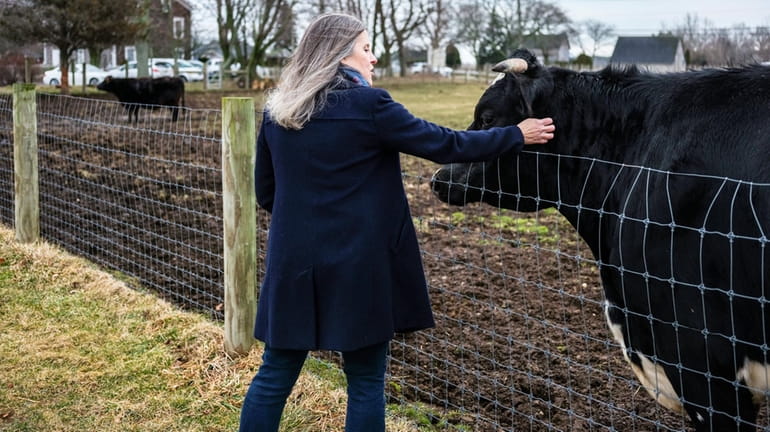
Heather Johnson bonds with Rosie at Hallockville Museum Farm in Riverhead. Credit: Newsday/Steve Pfost
Heather Johnson didn't always start her day greeting cows on her way into work.
“I didn’t know how to pet a cow,” she said, holding a hand out to nuzzle Rosie’s head on a recent cloudy morning.
Bonding with Rosie, Darla and other animals now comes with the territory after Johnson, 60, took on her new role in January as executive director at Hallockville Museum Farm in Riverhead. Johnson said she wants to introduce more diverse programs to attract new visitors to the site while making improvements to some of the buildings, including the $1 million Naugles Barn renovation.
The museum has 19 historic buildings on the 28-acre property, including a home with sections that date to 1765. Inside, the house is decorated with period furnishings from the wallpaper to place settings at an antique table. Guided tours help depict life 200 years ago, from cooking on a cast iron stove to saving and reusing rainwater.
The nonprofit was established in 1975 to honor Long Island’s farming roots and explore their relevance today.
The Smithtown resident previously led Friends of the Bay in Oyster Bay for six years. Johnson said it was a "phenomenal job" that she'll miss, though environmental work can be challenging.
Dale Moyer, co-president of Hallockville's board of directors, said Johnson was hired for her experience and dedication to nonprofit work.
Moyer said renovating the 1937 barn is a priority that includes new bathrooms, heating and other improvements.
"We're short on classroom space," particularly for year-round programs, Moyer said. "It's pretty tight, especially if you're demonstrating weaving baskets or quilting." The project is expected to be completed by spring 2025.
The nonprofit, managed by a board of 13 volunteers, has an annual budget of about $450,000.
Johnson previously served as the director of the Northport Historical Society and said she wanted to return to the field.
"It's upbeat, it's optimistic," she said, adding she's most looking forward to helping host events for families.
Newsday recently caught up with Johnson to talk about her passion for farming and history. The interview has been edited for length and clarity.
How did you get interested in history?
My mom was an opera singer, so we lived in Europe when I was little, in Switzerland and England. I loved the cobblestone streets and thinking about people living there from years ago.
I think it’s the idea of studying the past and seeing how things have changed since then. And feeling connected to it — not feeling like it’s something that’s so far removed. We're just an extension of things that happened in the past.
How does that connect to Hallockville’s mission?
It’s like going back in time. It’s fun to see how people lived: what they ate, what clothes they wore, how they entertained themselves.
What drew you to Hallockville?
Sustainability is a huge part. People in the 18th, 19th, 20th century had to be sustainable. That’s how you survived. Everything they harvested, be it plant or animal, everything was used.
That’s one big way Hallockville talks about the past but also brings it to relevance in the present. It’s a good example for us even in the present day. Waste not, want not.
Do you remember your first visit to the homestead? What caught your eye?
I came for the holiday open house and went for a tour of the house. It was neat to see the furniture, the wallpaper. The last room I went into was the kitchen. It was cozy and smelled like cookies. They had the molasses cookie recipe up so you could see. It’s a sweet memory.
There’s the historical part and there’s gardening, beekeeping, craft classes. All my passions, I can find here at Hallockville. It’s a very vibrant place.
What are some projects you’re excited about?
The Naugles Barn renovation will be a game-changer. The $500,000 grant that Hallockville received from New York State will allow us to run programs year-round. The best spot to do those community programs is the barn, but it’s not heated. We’re trying to preserve the character of the barn while bringing it up to modern standards and making it comfortable.
Once the barn is renovated, I’m hoping we can introduce some new programs. We want to be as inclusive as possible and appeal to an audience of all ages and all walks of life.
What other opportunities are you looking forward to?
I’m hoping to do a potato festival. It wouldn’t just be about the food, it’d be about the history of potato farming on Long Island.
The other thing is the Homestead Barn. We have it open for tours during fairs and festivals, but I would like it to become even more visitor friendly. There’s a little exhibit with farm tools, there’s a potato exhibit.
Hallockville is very unique. Its farm heritage is proudly displayed.
Are there any new programs this year?
The walking tours are a neat way to start because they hit all assets. One of them will be on barn architecture, there’s one on farm equipment. We tie in the history but also talk about how it applies today. There’s one on native trees and one I find really cool is on medicinal plants.
Heather Johnson didn't always start her day greeting cows on her way into work.
“I didn’t know how to pet a cow,” she said, holding a hand out to nuzzle Rosie’s head on a recent cloudy morning.
Bonding with Rosie, Darla and other animals now comes with the territory after Johnson, 60, took on her new role in January as executive director at Hallockville Museum Farm in Riverhead. Johnson said she wants to introduce more diverse programs to attract new visitors to the site while making improvements to some of the buildings, including the $1 million Naugles Barn renovation.
The museum has 19 historic buildings on the 28-acre property, including a home with sections that date to 1765. Inside, the house is decorated with period furnishings from the wallpaper to place settings at an antique table. Guided tours help depict life 200 years ago, from cooking on a cast iron stove to saving and reusing rainwater.
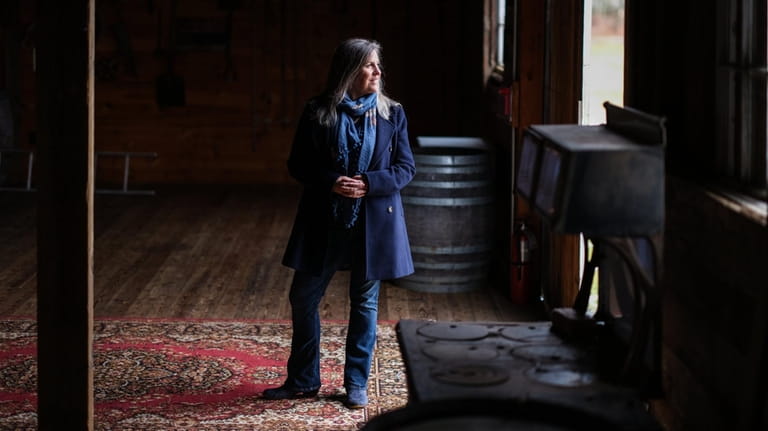
Hallockville Museum Farm executive director Heather Johnson inside the Naugles Barn on the grounds of the Hallockville Museum Farm in Riverhead on Feb. 23. Credit: Newsday/Steve Pfost
The nonprofit was established in 1975 to honor Long Island’s farming roots and explore their relevance today.
The Smithtown resident previously led Friends of the Bay in Oyster Bay for six years. Johnson said it was a "phenomenal job" that she'll miss, though environmental work can be challenging.
Dale Moyer, co-president of Hallockville's board of directors, said Johnson was hired for her experience and dedication to nonprofit work.
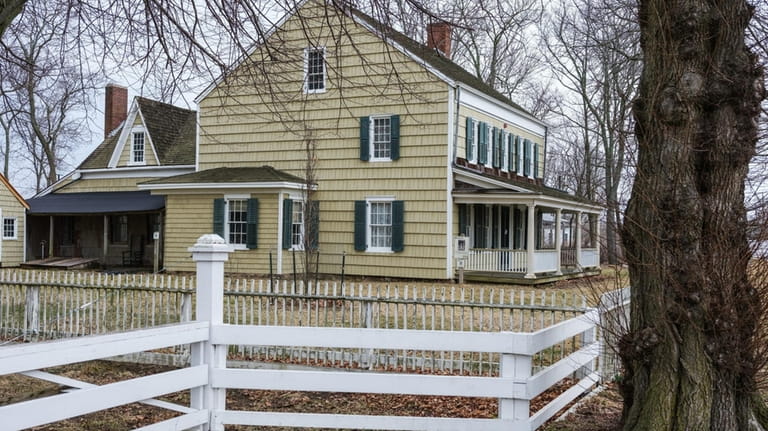
The Hallock homestead on the grounds of Hallockville Museum Farm. Credit: Newsday/Steve Pfost
Moyer said renovating the 1937 barn is a priority that includes new bathrooms, heating and other improvements.
"We're short on classroom space," particularly for year-round programs, Moyer said. "It's pretty tight, especially if you're demonstrating weaving baskets or quilting." The project is expected to be completed by spring 2025.
The nonprofit, managed by a board of 13 volunteers, has an annual budget of about $450,000.
Johnson previously served as the director of the Northport Historical Society and said she wanted to return to the field.
"It's upbeat, it's optimistic," she said, adding she's most looking forward to helping host events for families.
Newsday recently caught up with Johnson to talk about her passion for farming and history. The interview has been edited for length and clarity.
How did you get interested in history?
My mom was an opera singer, so we lived in Europe when I was little, in Switzerland and England. I loved the cobblestone streets and thinking about people living there from years ago.
I think it’s the idea of studying the past and seeing how things have changed since then. And feeling connected to it — not feeling like it’s something that’s so far removed. We're just an extension of things that happened in the past.
How does that connect to Hallockville’s mission?
It’s like going back in time. It’s fun to see how people lived: what they ate, what clothes they wore, how they entertained themselves.
What drew you to Hallockville?
Sustainability is a huge part. People in the 18th, 19th, 20th century had to be sustainable. That’s how you survived. Everything they harvested, be it plant or animal, everything was used.
That’s one big way Hallockville talks about the past but also brings it to relevance in the present. It’s a good example for us even in the present day. Waste not, want not.
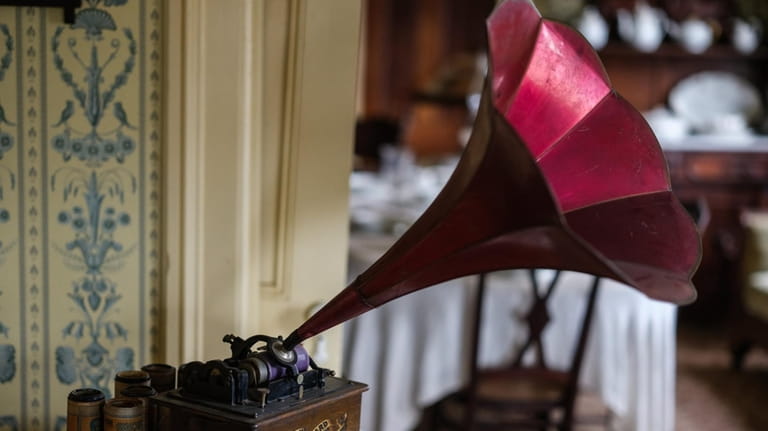
"It’s like going back in time. It’s fun to see how people lived: what they ate, what clothes they wore, how they entertained themselves," Johnson said. Credit: Newsday/Steve Pfost
Do you remember your first visit to the homestead? What caught your eye?
I came for the holiday open house and went for a tour of the house. It was neat to see the furniture, the wallpaper. The last room I went into was the kitchen. It was cozy and smelled like cookies. They had the molasses cookie recipe up so you could see. It’s a sweet memory.
There’s the historical part and there’s gardening, beekeeping, craft classes. All my passions, I can find here at Hallockville. It’s a very vibrant place.
What are some projects you’re excited about?
The Naugles Barn renovation will be a game-changer. The $500,000 grant that Hallockville received from New York State will allow us to run programs year-round. The best spot to do those community programs is the barn, but it’s not heated. We’re trying to preserve the character of the barn while bringing it up to modern standards and making it comfortable.
Once the barn is renovated, I’m hoping we can introduce some new programs. We want to be as inclusive as possible and appeal to an audience of all ages and all walks of life.
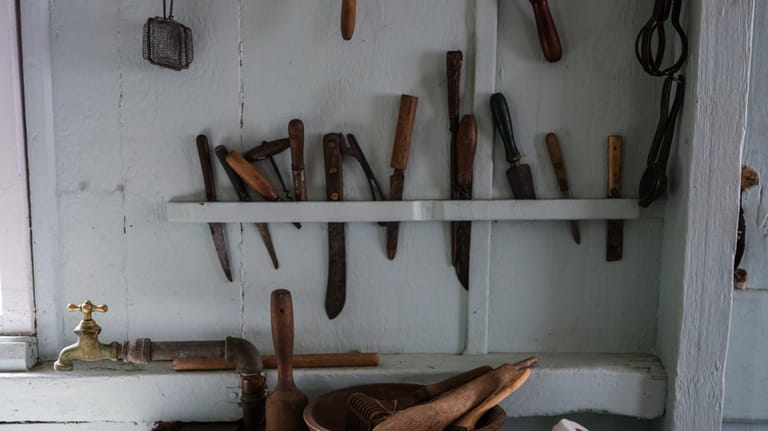
The Homestead Barn includes an exhibit with farm tools. Credit: Newsday/Steve Pfost
What other opportunities are you looking forward to?
I’m hoping to do a potato festival. It wouldn’t just be about the food, it’d be about the history of potato farming on Long Island.
The other thing is the Homestead Barn. We have it open for tours during fairs and festivals, but I would like it to become even more visitor friendly. There’s a little exhibit with farm tools, there’s a potato exhibit.
Hallockville is very unique. Its farm heritage is proudly displayed.
Are there any new programs this year?
The walking tours are a neat way to start because they hit all assets. One of them will be on barn architecture, there’s one on farm equipment. We tie in the history but also talk about how it applies today. There’s one on native trees and one I find really cool is on medicinal plants.
Walk through history
Natural and agricultural history will be in the spotlight during guided walking tours this spring at Hallockville Museum Farm. Admission is $10 (free for members) and the sessions include:
- Barn Architecture of the North Fork, April 13.
- Native Trees of the East End, May 11.
- Historical Farm Equipment, June 1.
- Plants are Good Medicine, June 22.
More information: hallockville.org/walkingtours
